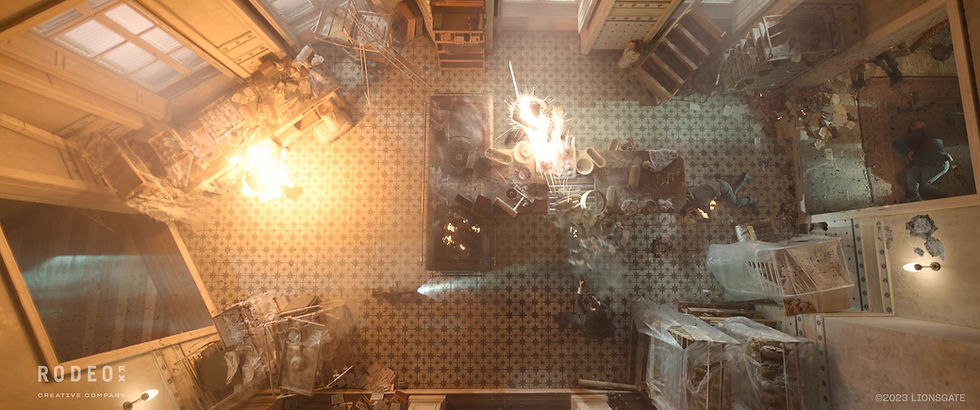🧠 Food for Thought - The Double Role: Jawan.
- John Maurice Otieno

- Mar 4
- 5 min read
Updated: Jun 24

Ra One, Krrish, Dhoom 3... just to name a few. Perhaps no movie industry enjoys the use of the double role more than Bollywood, and perhaps no actor more than Shah Rukh Khan.
The gifted movie icon, known affectionately by his massive following as "King Khan", has brilliantly pulled off the feat of playing dual roles on the big screen in films such as Duplicate, Don, the aforementioned Ra One, and his latest blockbuster to do so, Jawan.

When a character's seemingly mirrored or juxtaposed on the big screen via uncanny likeness, is it just art for art's sake, or is it something more? The double role is a clever tool that when deployed effectively, filmmakers can use for misdirection, suspense building, humor, as well as exploring certain weighty themes and dynamics. Jawan does exploit the stylistic device for all of the above purposes. How, exactly? Well, let's explore that. And as always, spoiler alert!

1. Misdirection.
A red herring, or misdirection, is a literary device used by filmmakers to deceive, mislead or misdirect the audience.
In Jawan, a seasoned character who identifies himself as Vikram Rathore takes a train brimmed with passengers hostage, but when he later takes off his make-up, we realize he's a lot younger than earlier implied, and eventually find out his real identity, Azad. Furthermore, we're initially led to believe he's a terrorist when he kills a passenger in cold blood, but when we later discover his true "Robin Hood" intentions, and as the supposedly "dead" passenger turns out to be perfectly fine from the earlier smoke screen, we realize he's a vigilante, not a terrorist.

2. Suspense.
One of the most crucial parts of the job of a filmmaker or writer is to keep the audience hooked by evoking the anticipation and excitement realized by the ultimate suspense.
In Jawan, we meet Vikram holding a train hostage, only to then realize that the figure isn't actually Vikram, but Azad playing dress-up. This makes us wonder who Vikram actually is, whether he's even an actual person, or just a persona created by Azad. And when we finally meet Vikram as he comes to Azad's rescue, we can't help but wonder why he looks exactly like Azad, and what the nature of the relationship between the two is.

3. Humor.
When exploited with care and wit, fun moments of respite and laughter can be found in using the double role, even in a heavily emotionally weighty experience like Jawan.
When Vikram saves Suji (Azad's step daughter), because of their uncanny resemblance, she can't help but imagine that it's her father coming to her rescue and calls him, "Papa!" Dumbfounded and devoid of all memory of his past life, Vikram wonders out loud whether other than Azad, Suji's yet another one of his offspring whom he's yet to remember. His comrades' hearty laughter mirrors ours as the sympathetic yet humored audience.

4. Themes.
Jawan brilliantly exploits the double role stylistic device to explore certain weighty themes that are reflectent of the current society.
Love.
The love of a son who never knew his falsely-accused-of-treason father, but still promises his mother that he'll grow up to clear his father's name is explored here. Furthermore, Vikram and Azad share a deep affection for Aishwarya, Azad's late mother and Vikram's late wife. When Vikram regains his memories, he finally allows Azad to kiss him, emphasizing his love for his son that stems from the passionate love he had for his deceased wife. He is her son and she was the love of his life. He is his son.
Corruption.
Vikram exposes Kalee's firm for taking shortcuts to manufacture faulty weapons for the country's armed forces. Meanwhile, Azad forcing the government's hand to solve the healthcare problems that would typically take "five years" in just a meager five hours is the epitome of the corruption that's so deeply rooted in the system. He also helps the hardworking farmers whose laborious efforts that the country's built on repay their debts and exposes the fact that a tractor's loan interest is higher than a Mercedes', proving how the rich keep exploiting the poor for their own self-interests.
Patriotism.
Vikram's a zealous soldier ("jawan") who's willing to lay down his life for his country, while Azad's a prison warden who's dedicated to helping the incarcerated women under his care gain better cards than the ones they were dealt. He's also a vigilante looking to root out the evil vice of corruption that ails his society.

5. Dynamics.
Various character dynamics tend to naturally bubble up when exploring the double role and in Jawan, the following dynamics surface:
Father & Son.
A son who uncannily resembles the father. We've seen this before in Krrish and one thing it tends to portray is a father's legacy living on in his progeny. It's no different in Jawan as Azad sets out to clear his father's name whilst also displaying the kind of passionate patriotism that's reminiscent of his father through his vigilantism and warden duties that serve the society for the better.
Soldier vs Vigilante.
Vikram's a dedicated soldier whose love for his country is unrelenting, while his son, Azad, goes in a different direction in the sense that his vigilante-like heroics mean he operates outside the law, but the fact that he's going up against a deeply corrupt system that's rotten at its core means he's actually fighting for his country, just like his father before him. In many ways, Vikram and Azad are two sides of the same patriotic coin.

The Nutshell.
So, in a nutshell, the double role can be a very effective storytelling device when wittily and profoundly exploited, helping explore weighty societal themes and issues whilst also delivering a fun and action-packed entertainment experience. It takes a crafty filmmaker and a truly talented actor to pull off. It's no wonder Jawan was a huge success and performed exceptionally well at the box office.

What's your take on the double role? Do you think it was pivotal in Jawan's success? Food for thought 🧠






Comments